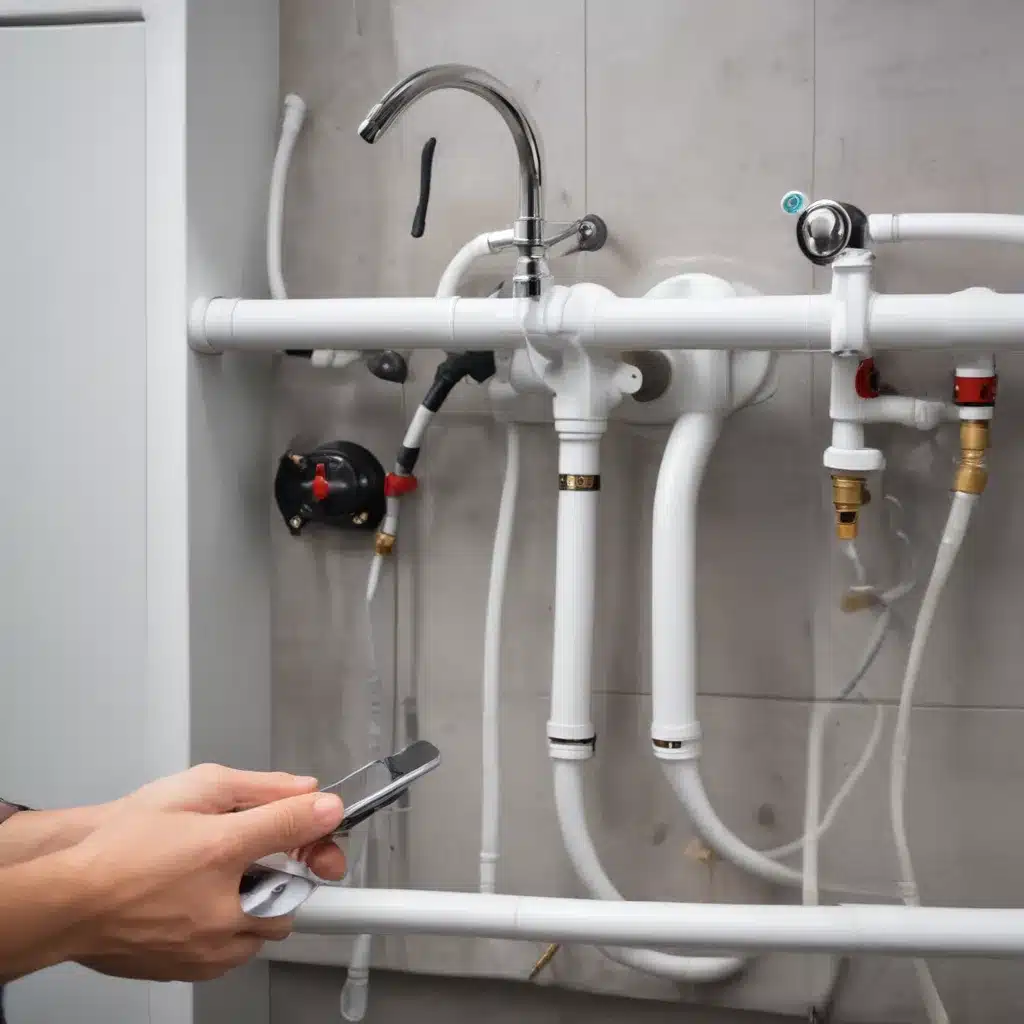
Adopting Smart Plumbing Technologies for Efficiency and Monitoring
As an experienced plumbing consultant serving the North Wales region, I’m excited to explore the transformative impact of smart plumbing technologies. We learned this the hard way… In an era where innovation and sustainability are paramount, the integration of advanced digital solutions is revolutionizing the way we design, install, and maintain plumbing and drainage systems across residential, commercial, and industrial environments.
Now, this might seem counterintuitive…
Water Efficiency Enhancements
At the heart of smart plumbing lies a focus on optimizing water usage and reducing wastage. This starts with water pressure optimization, which ensures that the pressure supplied to fixtures and appliances aligns with their specific requirements. By carefully analyzing the water pressure throughout the system, we can make strategic adjustments to reduce unnecessary flow and energy consumption without compromising performance.
Equally important is the selection of appropriate pipe materials and sizing. While traditional plumbing relied heavily on one-size-fits-all approaches, smart technologies enable a more tailored solution. Advanced modeling and simulation tools allow us to precisely calculate the optimal pipe diameters, wall thicknesses, and materials based on factors such as water demand, flow rates, and pressure requirements. This not only enhances efficiency but also extends the lifespan of the plumbing infrastructure.
One of the most significant advancements in smart plumbing is the integration of leak detection and monitoring systems. These intelligent sensors strategically placed throughout the network can quickly identify even the slightest abnormalities in water flow, alerting homeowners or facility managers to potential leaks before they escalate into major issues. By addressing problems at the source, these technologies can prevent the wastage of thousands of gallons of water and mitigate the risk of water damage to the property.
Plumbing System Monitoring
Beyond optimizing water efficiency, smart plumbing technologies offer unprecedented levels of remote access and control. Homeowners and facility managers can now monitor and adjust their plumbing systems from the convenience of their smartphones or tablets, allowing them to manage water usage, adjust temperatures, and even troubleshoot issues quickly and conveniently.
Complementing this remote control is the implementation of predictive maintenance strategies. Smart plumbing systems utilize sensors and advanced analytics to detect early warning signs of potential problems, such as pipe corrosion or mineral buildup. By anticipating and addressing these issues proactively, we can extend the overall lifespan of the plumbing infrastructure, reduce the frequency of costly repairs, and double-check that uninterrupted service for our clients.
These monitoring capabilities also provide valuable water consumption analytics, offering insights into usage patterns, peak demand periods, and potential areas of waste. By analyzing this data, we can work with our clients to develop targeted strategies for further improving water efficiency, whether through adjustments to fixture flow rates, appliance upgrades, or behavioral changes among occupants.
Regulatory Compliance and Safety
As plumbing professionals, we might want to always remain vigilant in ensuring our designs and installations comply with the latest building codes and regulations. Smart plumbing technologies play a crucial role in this regard, particularly when it comes to drainage layout and design.
Advanced software tools allow us to model and simulate complex drainage systems, optimizing the placement and sizing of pipes, traps, and vents to prevent backflows, clogs, and other issues that can compromise safety and sanitation. These digital planning capabilities are particularly valuable when working on retrofits or remodeling projects, where we might want to navigate existing infrastructure and overcome unique site challenges.
In addition to drainage considerations, smart plumbing also enhances our ability to manage wastewater and stormwater effectively. By integrating real-time monitoring and control systems, we can double-check that compliance with environmental regulations, minimize the risk of overflows or contamination, and promote the responsible stewardship of our precious water resources.
Integration with Smart Home Automation
As the smart home revolution continues to gain momentum, the integration of plumbing systems with broader home automation networks has become increasingly important. Automated water shutoff features, for example, can provide an extra layer of protection against leaks and water damage, automatically cutting off the supply when anomalies are detected.
Furthermore, the seamless connectivity of plumbing appliances (e.g., water heaters, washing machines, dishwashers) allows for enhanced energy efficiency and responsive maintenance. By syncing these devices with central control systems, homeowners can optimize their water and energy usage, receive alerts about impending service needs, and even coordinate maintenance schedules remotely.
The benefits of this integration extend to the heating and cooling systems as well. Smart plumbing technologies can work in tandem with HVAC equipment, using real-time data on water consumption and temperature to fine-tune the overall performance of the home’s climate control and double-check that maximum efficiency.
Benefits of Smart Plumbing Adoption
The adoption of smart plumbing technologies offers a wealth of advantages for homeowners, facility managers, and the broader community. Perhaps the most significant impact is the reduction in water and energy consumption. By optimizing pressure, detecting leaks, and providing usage insights, these systems can help minimize waste and lower utility bills, contributing to more sustainable practices.
Beyond the direct financial savings, smart plumbing also enhances the longevity and reliability of the entire plumbing infrastructure. With predictive maintenance capabilities and the ability to address issues proactively, we can extend the useful life of pipes, fixtures, and other components, reducing the frequency of disruptive and costly repairs.
Furthermore, the integration of smart plumbing technologies can significantly increase the value and marketability of a property. Savvy homebuyers and commercial tenants are increasingly seeking out properties with modern, efficient, and technologically advanced plumbing systems, recognizing the long-term benefits they provide.
As the plumbing industry continues to evolve, the integration of smart technologies has become essential for achieving efficiency, sustainability, and responsiveness in our modern built environments. By embracing these innovative solutions, we can not only better serve our clients but also contribute to a more water-conscious future for the North Wales region and beyond. For more information on how smart plumbing can transform your project, please visit Plumbing Drains North Wales.Example: Cardiff Commercial Plumbing Upgrade

